The Prague Massacre of 1794
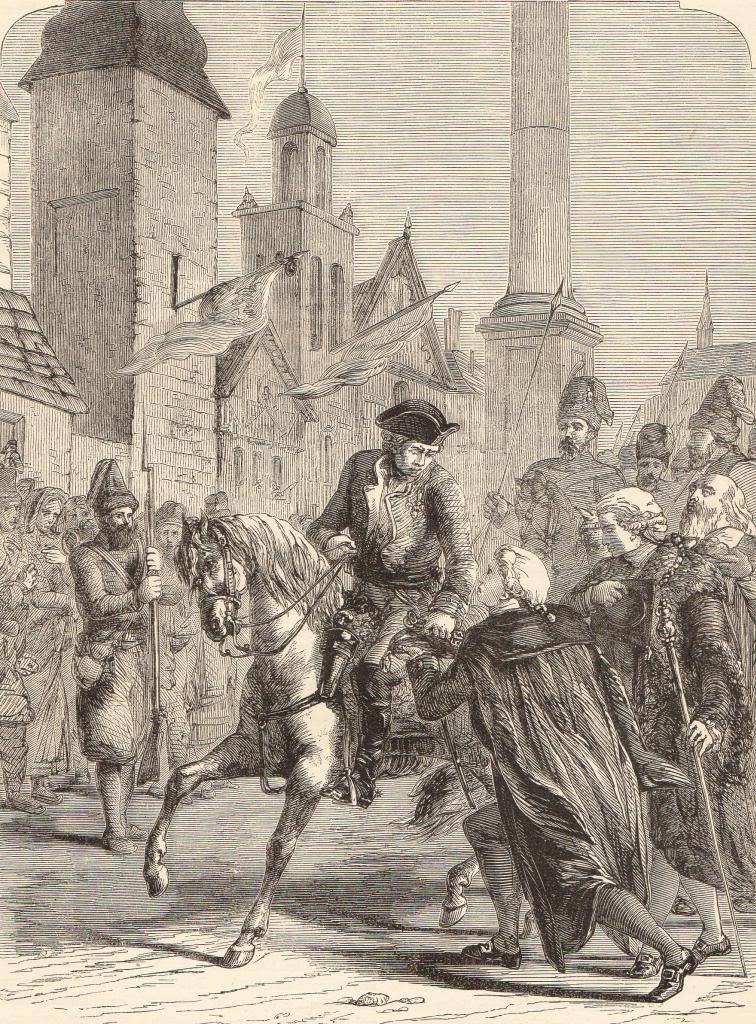
General Suvorov in surrendered Warsaw. 1794 year
In the previous article (The Warsaw Matins of 1794) it was told about the beginning of the rebellion in Poland and the tragic events that took place in Warsaw, where on April 6 (17), 1794, 2265 Russian soldiers and officers were killed (the number of victims later increased). Now we continue this story, ending it with a report on the third and final section of the Commonwealth.
The triumphant return of Suvorov to Poland
According to eyewitnesses, Catherine II, learning about the massacre of unarmed soldiers organized by the Poles, including in Warsaw churches, fell into a state of hysteria: she screamed into her voice, banging her fists on the table. She ordered revenge for the treacherous murder of Russian soldiers and officers and restore order in Poland to Field Marshal P. A. Rumyantsev. For health reasons, he shied away from this duty, instead sending himself General-General A.V.Suvorov, who at that time was in Ochakovo.
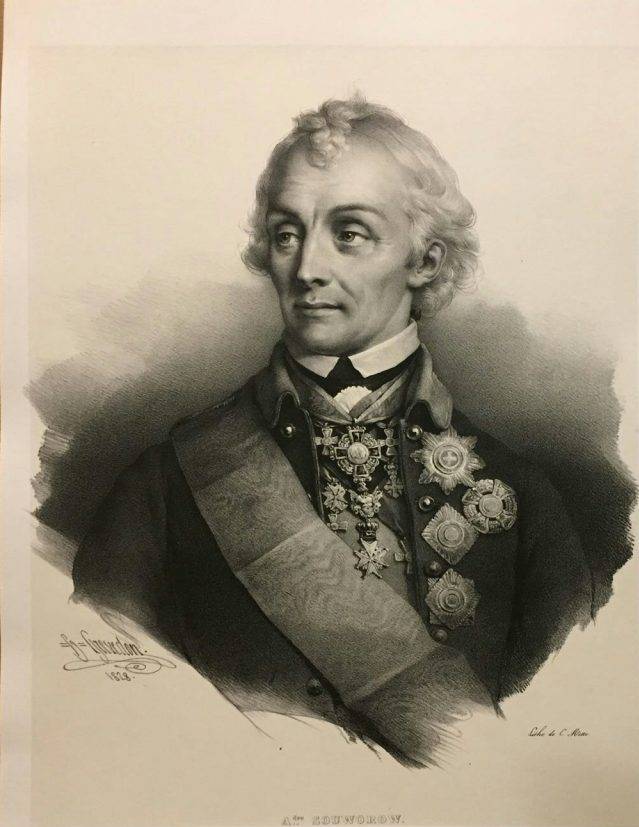
Henri Grevedon. Portrait of Suvorov
Upon learning of this appointment, Suvorov said:
Suvorov could say so with good reason: he knew how to beat the Poles, which he demonstrated during the campaign in Poland from 1769-1772. It was here, by the way, that he received the first general rank: starting the war with the rank of foreman, he ended it with a major general.
More than twenty years have passed since then, but the Poles of Suvorov did not forget and were very afraid - so much so that the leaders of the rebellion decided to deceive their supporters. They began to spread rumors among the rebels that Count Alexander Vasilievich Suvorov, known to him for his military talents, was either killed near Ishmael, or located on the border with the Ottoman Empire, which was about to attack Russia. According to their assurances, the namesake of this commander should have come to Warsaw. But the real Suvorov went to Warsaw, who on August 22, 1794 ordered his troops:
Meanwhile, the Russians fought well without Suvorov, and on August 12 the city of Vilno surrendered to Russian troops. On August 14, its residents signed an act of loyalty to Russia. And on October 10 (September 29), in a battle with a detachment of the Russian general I. Ferzen, near Matzewice, Kostyushko was wounded and captured by the “dictator of the uprising and generalissimo”.
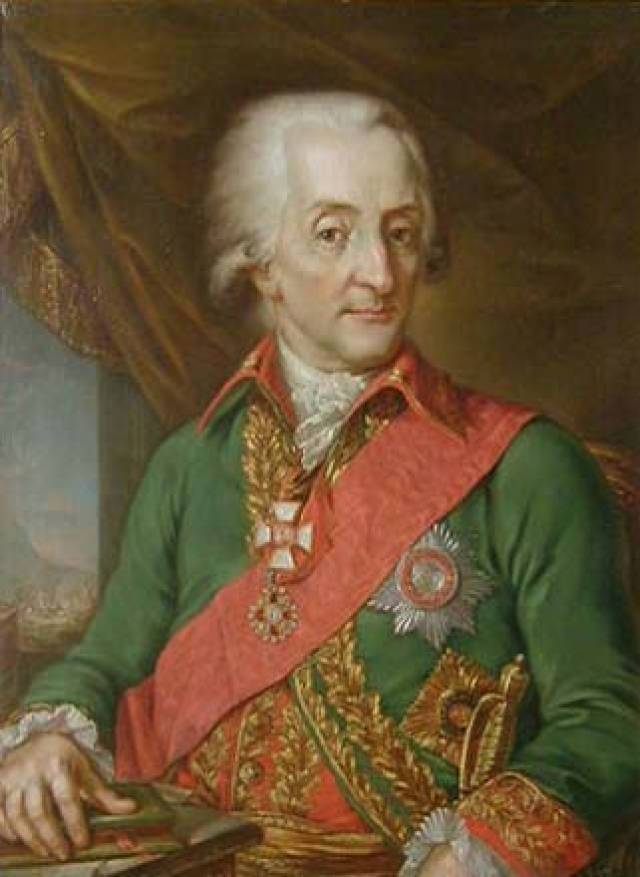
A. Zhdanov. Portrait of Ivan Evstafievich Ferzen, 1795
Prussian and Austrian troops also took part in this war.
The Austrians, commanded by Field Marshal Lassi, took the city of Helm on June 8. Prussian detachments led by King Frederick William II himself, in alliance with the corps of Lieutenant-General I.E. Ferzen, occupied Krakow on June 15 and approached Warsaw on July 30, but were unable to take it and went to Poznan, where the anti-Prussian uprising began.
Suvorov, having only about 8 thousand soldiers with him, moving towards Warsaw, in August-September 1794 defeated the Poles at the village of Divin, at Kobrin, at Kruchitsa, near Brest and near Kobylka. After Suvorov’s victory at Brest, where the Poles lost 28 guns and two banners, Kosciuszko, a few days before his capture, ordered the use of barrage detachments in a new clash with the Russians:
And Suvorov, teaming up with other Russian units operating in Poland, and bringing the size of his army to 25 thousand people, on October 22 (November 3) approached the Polish capital.
Prague assault
The very next day, the Russian commander threw his troops to storm Prague - the well-fortified right-bank suburb of Warsaw. For the rebels, who most recently survived the more than two-month siege of the allied Prussian and Russian troops, this came as a complete surprise: they were set up for a many-month (if not many-year) war. Indeed, according to all the canons of martial art, storming Prague was crazy. The Russians had about 25 thousand soldiers and officers and 86 guns, among which there was not a single siege. Prague, well fortified during the months after the start of the uprising, was defended by 30 thousand Poles, who had 106 artillery pieces.
But Suvorov believed in Russian soldiers, and they passionately wanted to take revenge on the treacherous Poles for the murders of unarmed colleagues. The Russian commander knew about the mood of his subordinates, and the order given to them on the eve of the assault read:
He also guaranteed protection to all Poles that would come to the Russian camp.
But the Russians, remembering the fate of their comrades, were not inclined to spare the rebels, and the Poles, who suspected that there would be no forgiveness for treachery, defended themselves desperately, in fact hiding behind the peaceful population of Prague. And this fierce resistance only embittered the assault troops.
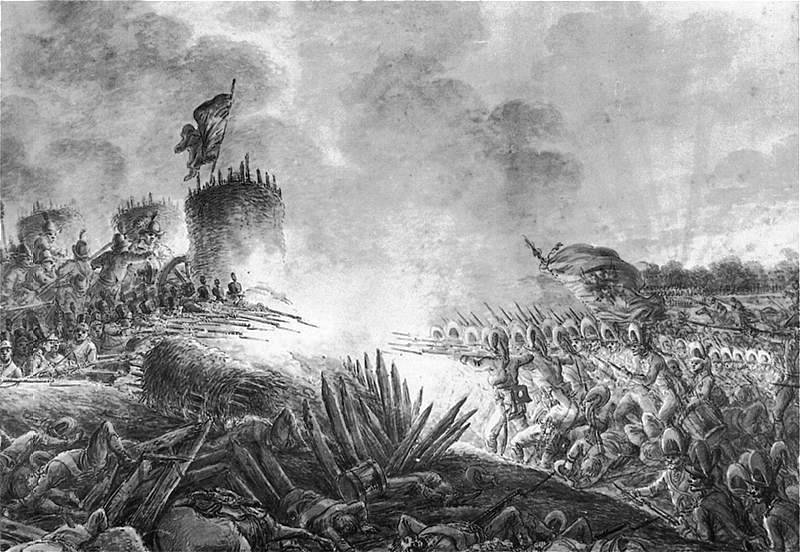
A. Orlovsky. The assault on Prague in 1794. Ink drawing on paper, 1797
The battle for Prague lasted only one day, but the participants in this operation compared it with the assault of Ishmael. The bitterness of the parties struck even seasoned eyewitnesses. Suvorovsky General Ivan Ivanovich von Klugen recalled:
He then told:
But as Suvorov himself recalled that terrible day:
The Polish composer M. Oginsky left such a description of this assault:
The result of this battle was the death of 10 to 13 thousand Polish rebels, about the same number were captured, the Russians lost about 500 people killed, and up to a thousand were wounded.
Suvorov, whom the Poles and Europeans sympathizing with later accused of terrible cruelty, actually saved Warsaw by ordering the bridges over the Vistula to be destroyed - so as not to allow troops captured by the excitement of battle to enter the Polish capital. The same goal was pursued by barriers set by Suvorov on the way to Warsaw.
Capitulation of Warsaw
The Russian commander gave the Warsaw an opportunity to capitulate on honorable terms, and they, shocked by the storming of Prague unfolding before their eyes, hastened to take advantage of this proposal. On the night of October 25, a delegation of the Warsaw Magistrate arrived at the Russian camp, dictating the terms of surrender. 1376 Russian soldiers and officers, 80 Austrian and more than 500 Prussian, were released. Moreover, only Russian troops were handed over without shackles - the rest remained tied until the last minute: in such a simple way the Warsaw tried to show their humility and apologize to their winners.
It is curious that the bridges across the Vistula that were burnt by the order of Suvorov were restored by the Poles themselves: it was through them that the Russian army entered Warsaw. The residents of the city passed the capital according to all the rules: on October 29 (November 9), Suvorov was met by magistrate members who handed him a symbolic key to the city and a diamond snuffbox with the inscription “Warszawa zbawcu swemu” - “The deliverer of Warsaw” (!). According to Russian tradition, Suvorov was also presented with bread and salt.
The surrendered Warsaw and its citizens escaped revenge for the killing of Russian soldiers and officers. Moreover, Suvorov turned out to be so generous and so confident in his strength and in the fear of the Poles that he almost immediately freed 6000 enemy soldiers who had recently fought against him, 300 officers and 200 non-commissioned officers of the royal guard. Outraged by his gentleness, the State Secretary of Catherine II D.P. Troshchinsky wrote to the Empress:
But the main “defenders of Prague” Suvorov could not be forgiven: the Polish generals Zayonchek and Wavzhetsky, having abandoned their troops, fled before the assault ended.
Opinion of Europe
All this did not save Suvorov from the "enlightened opinion of Europe", which declared him no less than "half-demon." And even Napoleon Bonaparte was not shy in expressions when he wrote about Suvorov to the Directory in the autumn of 1799: "The barbarian, drenched in blood of the Poles, brazenly threatened the French people." Poles, unlike the Russians, did not show their European political correctness even during the Warsaw Pact and the CMEA, referring to the events of that day as the “Prague Massacre”.
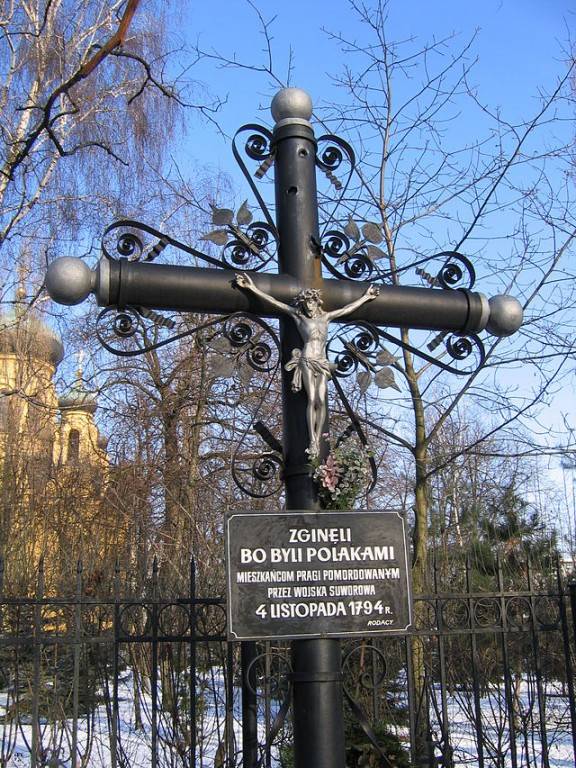
An iron cross erected in Warsaw in memory of the victims of November 4, 1794
I must say that the Polish and European versions of those events (about the complete and merciless beating of the civilian population of Prague) were traditionally accepted by many representatives of the liberal Russian intelligentsia. Even A. S. Pushkin, in the poem “Count Olizar” wrote:
Prague babies were beaten
When trampled into bloody ashes
The beauty of Kostyushkin’s banners.
The poet reports this with some pride, but the fact of “beating the Prague babies” does not deny.
By the way, much later A. A. Suvorov (the son of a child who was never recognized by the great commander) refused to sign a welcome address in honor of the name day of the Vilnius Governor-General M.N. Muravyov, who participated in the suppression of the next Polish uprising, and was awarded sadly ironic lines poems by F. M. Tyutchev:
Forgive us, our handsome prince,
That we honor the Russian cannibal,
We Russians are not asking Europe ...
...
How to excuse this courage before you?
How to justify empathy
Who defended and saved Russia whole,
Sacrificing everyone to his calling ...
So be shameful evidence to us
A letter to him from us, his friends -
But it seems to us, prince, your great grandfather
He would have sealed it with his signature.
(The poem is dated November 12, 1863, first published in the journal "Bell" by A. Herzen on January 1, 1864).
Actually, it is thanks to the quoted lines of Tyutchev that this dubious grandson of Suvorov today is sometimes remembered.
Another point of view on the events of 1794 was presented by Denis Davydov:
Suvorov knew what they said and wrote about him in European capitals, and then said:
The actions of Suvorov in Poland in 1794 are really worthy of surprise. G. Derzhavin wrote about Suvorov’s blow to Prague:
It was precisely for this campaign in Poland that Suvorov received the rank of field marshal, and Catherine II informed him that it was not she, but he "had made himself his victories as field marshals, violating seniority."
Other awards were the estate with serfs numbering 6922 male "souls", two Prussian orders - the Black and Red Eagle, and a portrait with diamonds, sent by the Austrian emperor.
What is good for the Russian ...
F. Bulgarin, referring to the story of von Klugen, already familiar to us, argued that it was in captured Prague that the famous saying “What is great for a Russian, death is a German” appeared and the author was Suvorov himself. The commander spoke so about the death of a German regimental doctor (according to other sources, he was a konoval), who, along with the Russian soldiers, drank the alcohol found in one of the pharmacies. However, nothing is said about the state of health of the Russian soldiers who drank this denatured substance: it is quite possible that they were also, to put it mildly, not too good.
The bitter fruits of the Polish adventure
The fall of Prague and the surrender of Warsaw led to the complete defeat of the demoralized Poles. All rebel squads piled up weapon in a week. Their last detachments retreated to the Sandomierz Voivodeship, where they surrendered to General Denisov near the city of Opochno and General Ferzen near the village of Radochina (General Wawrzycki, who became the Polish commander in chief, was also captured here).
In total, by December 1, 25 Polish soldiers were captured along with 500 cannons. But already on November 80, Suvorov informed Prince Repnin (in whose submission he was formally):
The results of this adventure for Poland were scary and sad.
On October 24, 1795, representatives of Austria, Prussia and Russia, gathered at a conference in St. Petersburg, announced the liquidation of the Polish-Lithuanian Commonwealth and even prohibit the use of the very concept of “Polish kingdom”.
November 25, 1795, the birthday of Catherine II, King Stanislav Poniatowski abdicated.
What is the attitude of the Poles to "their" participants in those events? The last legitimate monarch of the country, Stanislav Augustus Poniatowski, they have always despised and still do not like, calling them the "straw king". In 1928, an urn with ashes that did not have any special merits to Poland, King Stanislav Leshchinsky, was solemnly buried in the Wawel Cathedral of Krakow. And the remains of Stanislav Ponyatovsky, transferred to Poland by the Soviet authorities in 1938 (in this way the leaders of the USSR hoped to improve relations with their neighbors), were buried in the modest church of his hometown Volchina and only in 1995 were transferred to the Warsaw Cathedral of St. John.
But it was precisely Poniatowski who had every chance to keep at least part of the Polish-Lithuanian Commonwealth independent, if not for the active opposition of people who are considered heroes in Poland. It was these “patriots”, on the emblems of which one can rightly write the motto “Dementia and courage”, were the culprits of the terrible geopolitical catastrophe of the Polish-Lithuanian Commonwealth. Kociuszko and his associates provoked the Third (and last) partition of Poland with their actions. They did not die together with Poland and did not live in poverty after the defeat. Let's talk about some of them.
The fate of the rebels
General Jozef Zayonchek fought with Russia back in 1792. In 1794, he fought against the Russian troops in three battles (near Raclawice, Helm and Golkow), was a member of the Military Court and head of the defense of Warsaw. After the defeat, he fled to Galicia, from where a year later he moved to France, where he entered the service of Napoleon Bonaparte. He participated in the Egyptian campaign, was the commander of the Northern Legion, which consisted mainly of Poles, and rose to the rank of division general. In 1812 he again fought against Russia and lost his leg when crossing the Berezina, because of which he was captured in Vilna. Alexander I took him to the Russian service, appropriated the rank of general from infantry, and in 1815 he even appointed him his viceroy in the kingdom of Poland. Zayonchek received three Russian orders: St. Andrew the First-Called, St. Alexander Nevsky and St. Anna of the I degree. He died in Warsaw in 1826.
Another Polish general who fought against the Russian troops in 1794, Tomasz Wawrzecki, took an oath of allegiance to Russia in 1796, was a member of the Provisional Council that governed the Duchy of Warsaw, Senator and Minister of Justice of the Kingdom of Poland.
Jan Kilinsky, one of the ideologists and leaders of the Warsaw Matins (we recall that he personally killed two Russian officers and a Cossack), was released by Paul I, took the oath of allegiance to the Russian Empire, and continued to engage in subversive activities already in Vilna. He was arrested again - and again released. Having settled in Warsaw, until his death in 1819 he received a pension from the Russian government.
After the arrest, Tadeusz Kosciuszko lived quite comfortably in the house of the commandant of the Peter and Paul Fortress, until he was pardoned by Paul I, who entered the Russian throne, and presented him with 12 thousand rubles. Ko Костciuszko later returned this money, which raises very interesting questions about what kind of people (and which states) kept the Polish hero and patriot all this time: after all, he did not have his own sources of income. He lived in the USA and Europe, died in Switzerland in 1817. Currently, this leader of the uprising that buried the Polish-Lithuanian Commonwealth, contrary to everything, is considered one of the main national heroes of Poland.
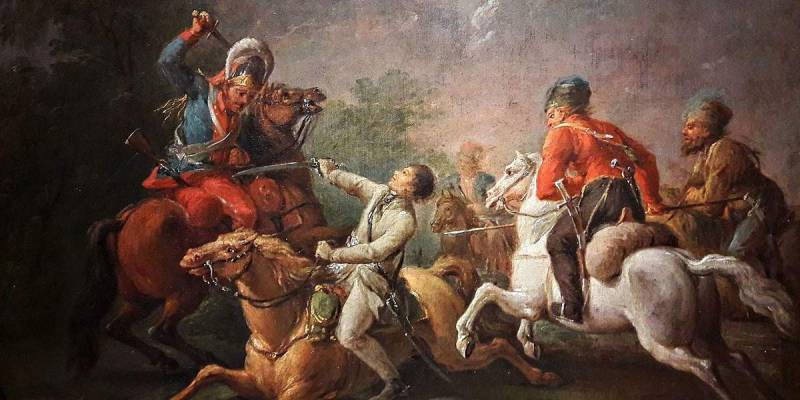
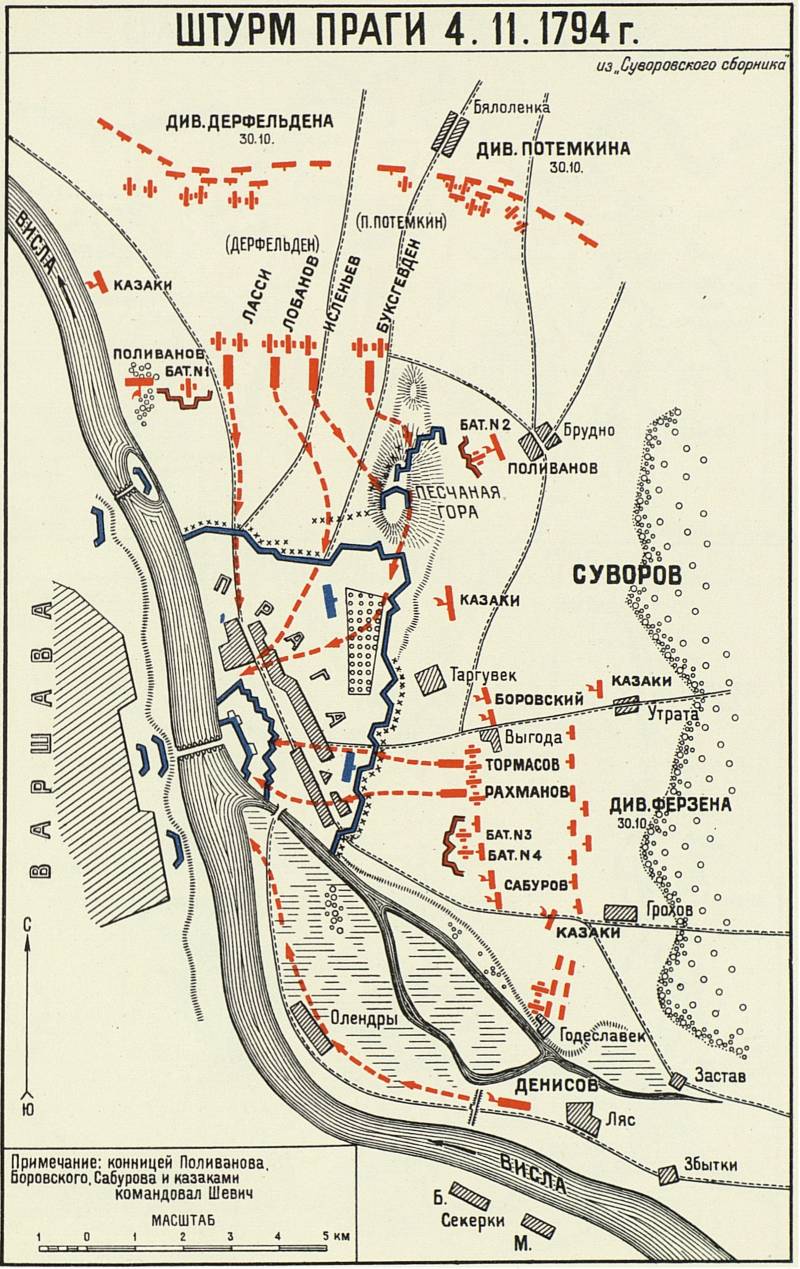
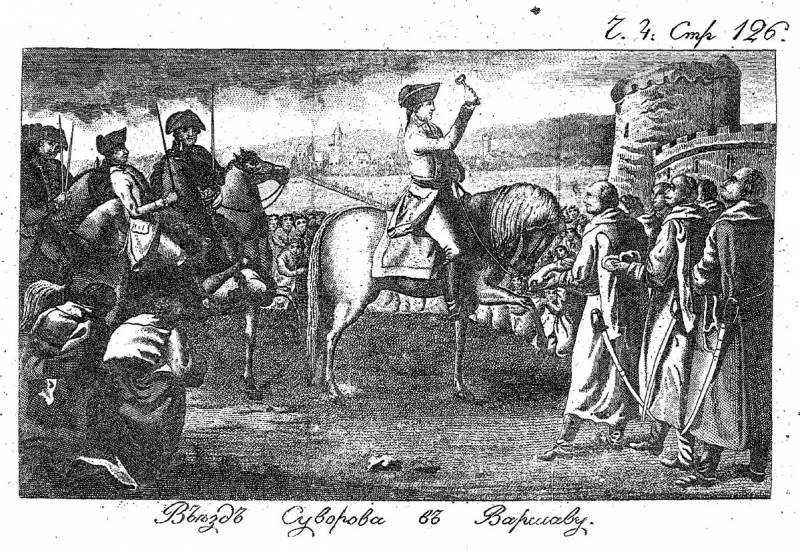
Information